Resources
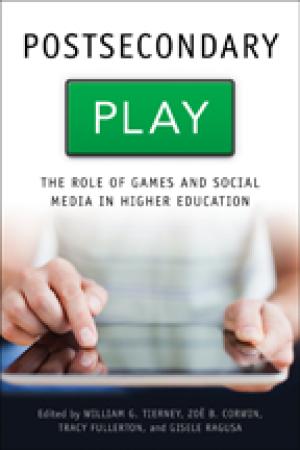
The college application process—which entails multiple forms, essays, test scores, and deadlines—can be intimidating. For students without substantial school and family support, the complexity of this process can become a barrier to access. William G. Tierney and his team at the University of Southern California approach this challenge innovatively. Using the tools of online games and social media, they have developed ways to make applying for college much less intimidating. While the vast majority of college students use social media and gaming in their everyday lives, colleges and universities have been slow to recognize and harness the power of either. Postsecondary Play explores the significance of games and social media in higher education, and particularly how they can be used to attract, retain, educate, and socialize students. Tierney, a past president of the American Educational Research Association, has gathered some of the best research on the emerging role of multiplayer games in the classroom and how these tools can boost student confidence and increase college access. Scholars writing from a wide variety of disciplines—college access, social media, game studies, and learning sciences—provide concrete examples to illustrate the new and complex ways in which students learn in response to social media and games. Tierney and the contributors find that, although games can be powerful tools for encouraging underserved students, quality game design and mastering the concept of play—the ability to develop skills while engaging in the game—are essential in the effective use of serious games in teaching and learning. Summarizing a decade of research in game design and learning, Postsecondary Play will appeal to higher education scholars and students of learning, online gaming, education, and the media. (From the Publisher)
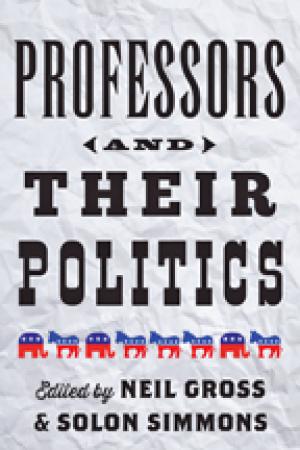
Click Here for Book Review Abstract: Professors and Their Politics tackles the assumption that universities are ivory towers of radicalism with the potential to corrupt conservative youth. Neil Gross and Solon Simmons gather the work of leading sociologists, historians, and other researchers interested in the relationship between politics and higher education to present evidence to the contrary. In eleven meaty chapters, contributors describe the political makeup of American academia today, consider the causes of its liberal tilt, discuss the college experience for politically conservative students, and delve into historical debates about professorial politics. Offering readable, rigorous analyses rather than polemics, Professors and Their Politics yields important new insights into the nature of higher education institutions while challenging dogmas of both the left and the right. (From the Publisher)
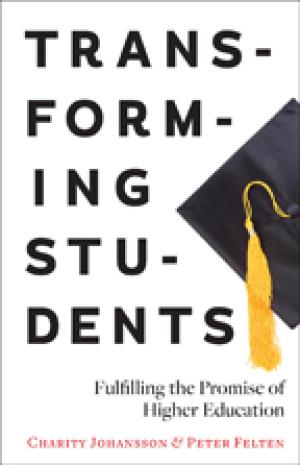
Click Here for Book Review Abstract: The recent trend of trying to measure higher education’s return on investment misses a fundamental point, argue Charity Johansson and Peter Felten. The central purpose of a college or university is to transform the lives of students—not to merely change them or help them mature. This transformation is an ongoing process of intentionally aligning one’s behavior with one’s core sense of personal identity. It is the university’s central role to lead students in this transformation, a process that shapes students into intentional, critical, and engaged individuals. Recognizing the remarkable influence of the college experience on peoples’ lives, the authors offer a guide to how colleges and universities can effectively lead students through this life-changing process. Drawn from extensive interviews with students and graduates, faculty and staff, Transforming Students gathers diverse stories to show how students experience the transformation process, which rarely follows a neat or linear path. The interviews illustrate central themes from the literature on transformative learning and the undergraduate student experience. A sequel of sorts to George Keller’s classic Transforming a College—which chronicled Elon University’s metamorphosis from struggling college to a top regional university— Transforming Students addresses the school’s core educational mission: to shape students into engaged adults who embrace learning as a lifelong endeavor. Given this effect, the college experience is much more than preparation for a career. It is preparation for life. (From the Publisher)
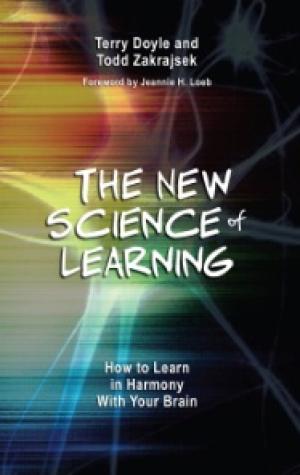
Click Here for Book Review Abstract: Learning to learn is the key skill for tomorrow. This breakthrough book builds the foundation every student needs, from freshman orientation to graduate school Recent advances in brain science show that most students’ learning strategies are highly inefficient, ineffective or just plain wrong. While all learning requires effort, better learning does not require more effort, but rather effectively aligning how the brain naturally learns with the demands of your studies. This book shows you what is involved in learning new material, how the human brain processes new information, and what it takes for that information to stick with you even after the test. Taking a small amount of time to read and act upon the material in this book will prove to be one of the best decisions you can make as a learner. What you discover will change the way you learn in college and will be helpful in your personal and professional life. You live in a world where you will have to be a lifelong learner, constantly updating your skills and changing jobs to compete in the global marketplace. Most college students today will have as many as 10-14 different jobs by age 38. Learning how to learn in harmony with your brain is crucial to your long-term success. This succinct book explains straightforward strategies for changing how you prepare to learn, engage with your course material, and set about improving recall of newly learned material whenever you need it. This is not another book about study skills and time management strategies, but instead an easy-to-read description of the research about how the human brain learns in a way that you can put into practice right away. Did you know neuroscientists have shown that memories are made while you sleep, and by studying right before sleeping you can make stronger memories for your information? In this book the authors explain the role that sleep, exercise and your senses play in learning; how memory works and what makes the brain pay attention; the importance of your mindset towards learning and pattern recognition; as well as new breakthroughs in brain science that can enhance your ability to learn new information and make later recall (for tests or everyday life) easier. (From the Publisher)
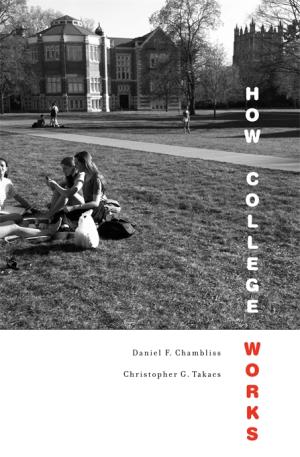
Click Here for Book Review Abstract: Constrained by shrinking budgets, can colleges do more to improve the quality of education? And can students get more out of college without paying higher tuition? Daniel Chambliss and Christopher Takacs conclude that the limited resources of colleges and students need not diminish the undergraduate experience. How College Works reveals the surprisingly decisive role that personal relationships play in determining a student’s collegiate success, and puts forward a set of small, inexpensive interventions that yield substantial improvements in educational outcomes. At a liberal arts college in New York, the authors followed a cluster of nearly one hundred students over a span of eight years. The curricular and technological innovations beloved by administrators mattered much less than the professors and peers whom students met, especially early on. At every turning point in students’ undergraduate lives, it was the people, not the programs, that proved critical. Great teachers were more important than the topics studied, and even a small number of good friendships—two or three—made a significant difference academically as well as socially. For most students, college works best when it provides the daily motivation to learn, not just access to information. Improving higher education means focusing on the quality of a student’s relationships with mentors and classmates, for when students form the right bonds, they make the most of their education. (From the Publisher)
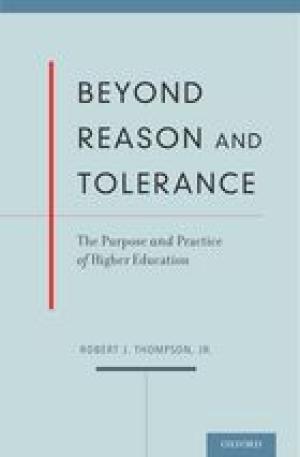
Click Here for Book Review Abstract: Provides a developmental science basis to inform necessary transformations in undergraduate educational practices Argues that emerging adulthood is an especially dynamic time of reorganization and development of the brain that both influences, and is influenced by, the undergraduate experience Synthesizes advances in our understanding of human development and learning Has direct implications for undergraduate education practices The major challenges facing higher education are often framed in terms of preparing students for life-long learning. Society's 21st century needs require civic-minded individuals who have the intellectual and personal capabilities to constructively engage political, ethnic, and religious differences, work effectively, and live together with many different kinds of people in a more global society. In this volume, Robert J. Thompson aims to influence the current conversation about the purposes and practices of higher education. Beyond Reason and Tolerance adopts a developmental science basis to inform the transformations in undergraduate educational practices that are necessary to empower students to act globally and constructively engage difference. It synthesizes current scholarship regarding the nature and development of three core capacities deemed essential: A personal epistemology that reflects a sophisticated understanding of knowledge, beliefs, and ways of thinking; empathy and the capacity to understand the mental states of others; and an integrated identity that includes values, commitments, and a sense of agency for civic and social responsibility. Beyond Reason and Tolerance argues that to foster the development of these capabilities, colleges and universities must recommit to providing a formative liberal education and adopt a developmental model of undergraduate education as a process of intellectual and personal growth, involving empathy as well as reasoning, values as well as knowledge, and identity as well as competencies. Thompson focuses on emerging adulthood as an especially dynamic time of reorganization and development of the brain that both influences, and is influenced by, the undergraduate experience. Advances in our understanding of human development and learning are synthesized with regard to the direct implications for undergraduate education practices. Readership: Faculty, graduate students, and undergraduate students in psychology, human development, and education who have an interest in intergroup relations and cognitive and social development during the period of emerging adulthood. (From the Publisher)
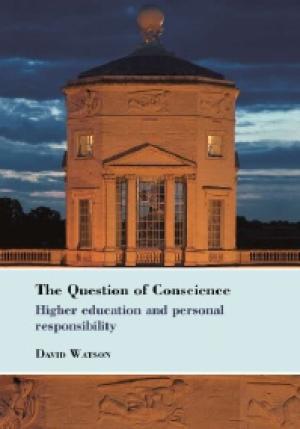
Click Here for Book Review Abstract: Most of the claims about the purposes and achievements of higher education are irreducibly individualistic: it will change your life, through conversion or confirmation of faith, by improving your character, by giving you marketable “abilities,” by making you a better member of the community, or by being simply “capable” of operating more effectively in the contemporary world. All of these qualities scale up, of course, but in differing ways. David Watson explores the question of what higher education sets out to do for students through a number of lenses, including the “evolutionary” stages of modern university history, the sense participants and observers try to make of them, and a collection of “purposes,” or intended personal transformations. The resulting combinations are clustered around major questions about the role of universities for their students, and in society at large. He concludes by testing claims about the role of higher education in developing varieties of personal responsibility. The Question of Conscience identifies and explores how varied these claims have been over the long history of the higher enterprise, but also how strong and determined they invariably are. (From the Publisher)
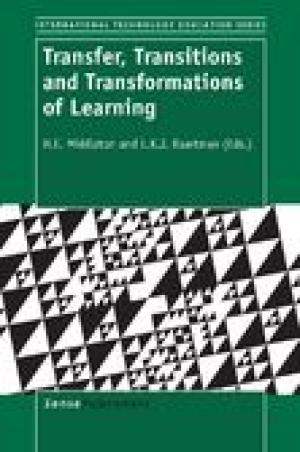
This book explores one of the enduring issues in educational research and one of the challenges for formal education. That is, understanding the relationship between learning in one context, setting or time and a subsequent related learning experience or activity. The chapters in the book examine the issue drawing on existing theory as starting points but using each author’s own research to push existing boundaries of what we know in terms of the ideas captured in the title of the book: transfer, transitions and transformations of learning. The chapters explore the issue through a range of approaches and settings including: possibilities for a concept-context approach to transfer, transfer between knowledge domains, transfer as an iterative process between contexts, transfer as boundary crossing between vocations, transfer as integration of theory and practice, transferring standards in assessment, representation in the transition from novice to expert, transformation of self through sustainability education, transforming identities of first year design and technology teachers and the role of implicit knowledge in understanding the relationship between declarative and procedural knowledge in the transition to expertise. This book should be of interest to teachers in schools and the adult education sector, research students, teacher educators, researchers and policy-makers who are involved in learning in, through or with technology. (From the Publisher)
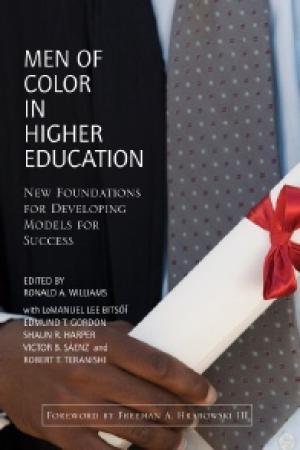
Click Here for Book Review Abstract: Given the continued plight of men of color in college after a decade of ineffective interventions focused more on “fixing the student” than on addressing the social, structural and institutional forces that undermine his academic achievement, this book is intended as a catalyst to change the direction of the dialogue, by providing a new theoretical framework and strength-based models for developing strategies for success. This book brings together five of today’s leading scholars concerned with the condition of males of color in higher education – LeManuel Bitsóí, Edmund T. Gordon, Shaun Harper, Victor Sáenz and Robert Teranishi, who collaborated closely through of a series of conversations convened by the College Board to diagnose the common factors impeding the success of under-represented males and to identify the particular barriers and cultural issues pertaining to the racial and ethnic groups they examine. This cohesive volume starts with the recognition that understanding males' disengagement from the classroom requires determining what it means to be a male in a non-dominant group in today’s society. The authors use the methods of feminist theory to uncover the impact of dominant paradigms of White, middle-class, heteronormative masculinity on men of color in general, to define what comprises masculinity for various groups, subgroups and individuals, and to lay bare the social and institutional forces that perpetuate constructions of masculinity that negatively impact men of color. They demonstrate that researchers and practitioners alike must pay more careful attention to within-group diversity as they study college men of color and create initiatives that respond to their varied needs. They establish the need for men of color campus initiatives to be mindful of the masculinities with which students enter college, as well as how they develop, negotiate and perform their gender identities on campus; the vital importance, in developing programs and interventions, of addressing the sociological undercurrents of men’s bad behaviors and poor help-seeking tendencies; and for providing opportunities for men to engage in critical individual and collective reflection on how they have been socialized to think of themselves as men. This book advances the critical priorities of increasing enrollments and completion rates among college men of color, and of graduating well-developed men with strong, conflict-free gender identities. For practitioners who work with these populations, it offers insights and signposts to create successful programs; for researchers it offers a set of new directions for analysis; and for policymakers, new ways of thinking about how policy and funding mechanisms ought to be reconsidered to be more effective in responding this issue. (From the Publisher)
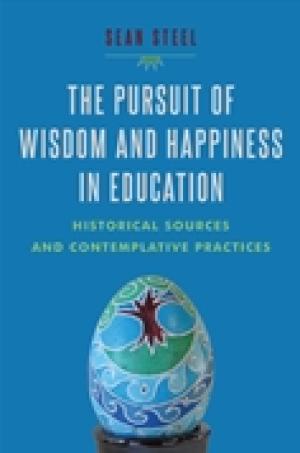
Click Here for Book Review Abstract: Explores the nature and role of wisdom in education. Modern scholarship has struggled to come to terms with the meaning of wisdom and its significance in the field of education. This book examines the importance of pursuing wisdom in schools by turning to ancient and medieval sources for clarification concerning the nature of wisdom. Sean Steel argues that our current emphasis on the development of rigorous critical-analytic thinking skills, on assessment, and on accountability in education has negatively impacted the ability of schools to foster an environment in which both students and teachers might pursue wisdom. Although in recent times efforts have been made to incorporate the pursuit of wisdom into schools through Philosophy for Children (P4C) and contemplative education programming, such initiatives have missed their mark. Steel therefore recommends not more accountability in education for the purpose of ensuring global competitiveness, but rather the institutional promotion of periods of leisure or schole in the school day. Drawing upon his own experiences as a teacher who has tried to encourage students to search for wisdom, the author discusses some of the challenges and pitfalls of wisdom seeking. He also offers examples of various wisdom-seeking activities that might bear fruit in the classroom. (From the Publisher)